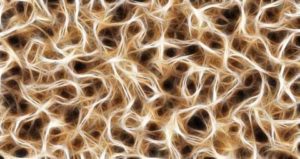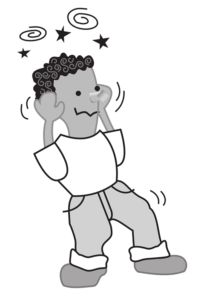
What you need to know about Dysautonomia and Celiac Disease
As if having celiac wasn’t enough, we also have to worry about dysautonomia as one of the related conditions. Actually, dysautonomia isn’t the actual condition, itself; it is an umbrella term for several conditions effecting the autonomic systems in the body. So, let’s talk about what dysautonomia is.
I am not a doctor, please talk to your doctor about dietary changes, testing and diagnosis. Make a plan with a trained medical professional on how to proceed with your health.
What is Dysautonomia?
 Like I said, it is an umbrella term. These conditions effect the function of the autonomic nervous system. So, we are talking about, the things your body just does, without you thinking about and they happen automatically. Some examples are: dilation of pupils, lung function, heart rate, blood pressure, etc. When the body isn’t properly regulating itself you can have heart palpitations, shallow breathing, anxiety, fainting, feel light headed, have malnutrition and more.
Like I said, it is an umbrella term. These conditions effect the function of the autonomic nervous system. So, we are talking about, the things your body just does, without you thinking about and they happen automatically. Some examples are: dilation of pupils, lung function, heart rate, blood pressure, etc. When the body isn’t properly regulating itself you can have heart palpitations, shallow breathing, anxiety, fainting, feel light headed, have malnutrition and more.
“Dysautonomia is not rare. Over 70 million people worldwide live with various forms of dysautonomia. People of any age, gender or race can be impacted. There is no cure for any form of dysautonomia at this time, but Dysautonomia International is funding research to develop better treatments, and hopefully someday a cure for each form of dysautonomia. Despite the high prevalence of dysautonomia, most patients take years to get diagnosed due to a lack of awareness amongst the public and within the medical profession.”
What are Dysautonomia Conditions?
There are 3 conditions under this umbrella: POTS (postural orthostatic tachycardia syndrome), Neurocardiogenic Syncope (NCS), and Multiple System Atrophy (MSA). These conditions are often secondary to a main condition, but not always. Some of the diseases dysautonomonia is found with are: diabetes, celiac, multiple sclerosis, rheumatoid arthritis, Sjogren’s syndrome, lupus and Parkinson’s.
The first two are invisible diseases while the third one progresses and becomes more pronounced and noticeable. Invisible, meaning you look great and function well; how could you possibly be sick?!
POTS
 The signs and symptoms can be subtle and/or look like a symptom of many, many other issues. At My Heart they describe these symptoms in greater detail. Please, check it out.
The signs and symptoms can be subtle and/or look like a symptom of many, many other issues. At My Heart they describe these symptoms in greater detail. Please, check it out.
Symptoms:
- Getting dizzy when standing
- Having a fast heart rate when going from sitting to standing (or even bending over to standing)
- Headaches
- Abdominal pain
- Nausea
- Chronic pain
- Heart palpitations
- Shortness of breath
- Sleeping problems- waking up frequently and night sweats
- Brain fog- difficulty focusing, thinking or communicating
- Reddish coloring in legs after standing
- Abnormal sweating- too much or too little
- Fatigue
- Chest pains
- Worse symptoms during menstruation
- Gynecological issues
- Shakiness
- Anxiety
Please go to this link http://www.dysautonomiainternational.org/page.php?ID=30 for more information on POTS and what it takes to get a diagnosis, as well as treatment.
Neurocardiogenic Syncope
 This is the most common form of dysautonomia and what most people are diagnosed as having. Neuro means it has to do with the nervous system; Cardio means it has to do with the heart; genic means it is causing or forming something and syncope literally means to faint. So, the nervous system is malfunctioning and causing the heart to beat faster because blood pressure has dropped, causing you to be light headed, dizzy or faint.
This is the most common form of dysautonomia and what most people are diagnosed as having. Neuro means it has to do with the nervous system; Cardio means it has to do with the heart; genic means it is causing or forming something and syncope literally means to faint. So, the nervous system is malfunctioning and causing the heart to beat faster because blood pressure has dropped, causing you to be light headed, dizzy or faint.
From the Dysautonomia International website it looks like there is a name change for this condition and is now being called: Neurally Mediated Syncope (NMS). (Seriously, Neurocardiogenic syncope is much more fun to say!) Please follow the link for more information on syncope, diagnosis and treatment.
This is a chronic condition where the blood pools in the extremities. When you go from sitting to standing (or, I have had this happen, from bending over or altering my verticalness in some way and then standing), blood pressure drops and heart rate increases. This causes you to be light headed, dizzy and may cause fainting.
Symptoms
- Fatigue
- Light headed
- Low blood pressure going from sitting to standing
- Fast heart rate going from sitting to standing
- Dizziness
- Fainting
Multiple System Atrophy
 This presents a lot like Parkinson’s disease and typically shows up after age 50. MSA is characterized by widespread nerve damage causing lots of problems, in lots of areas of the body. This means, symptoms can be in any part of the body. For a more comprehensive understanding of this condition please go to Dysautonomia International. Some of the symptoms are as the disease progresses and some are what happens late in the disease.
This presents a lot like Parkinson’s disease and typically shows up after age 50. MSA is characterized by widespread nerve damage causing lots of problems, in lots of areas of the body. This means, symptoms can be in any part of the body. For a more comprehensive understanding of this condition please go to Dysautonomia International. Some of the symptoms are as the disease progresses and some are what happens late in the disease.
Symptoms:
- Tremors
- Drop in blood pressure/ heart rate increases upon standing- causing light-headedness and fainting
- Headaches
- Dry mouth, eyes and skin
- abnormally dilated pupils
- Impotence
- Loss of bladder control
- Heart arrhythmias
- Difficulty eating, swallowing or chewing food
- Difficulty speaking
- Changes in voice
- Parkinson type symptoms
- Confusion
- Demensia
- Depression
Treatment for Dysautonomia
For most of these conditions, the treatment is as follows:
- Increase fluids
- Increase salt
- Wear compression stockings
- Exercise- mild aerobic or reclined exercise (rowing, swimming, recumbent cycling)
- Sleep with elevated head
- Medications- help with symptoms
There is no cure, just a managing of symptoms.
Celiac and Dysautonomia
There have been small studies performed to suggest that more research needs to be done to find out more about this connection between celiac an dysautonomia. There isn’t a lot on it, but it is out there. It is something to consider, if you have any of these symptoms, talk to your doctor about it. The majority of what I found, said that most dysautonomia patients were diagnosed after being diagnosed with celiac and while following a gluten free diet.
The question is whether dysautonomia patients should also be checked for celiac disease. It does seem to be found in a lot of celiac patients; is celiac in a lot of dysautonomia patients?
This may be the cause of the fatigue many celiac patients complain about, even when their celiac is well managed.





Recent Comments